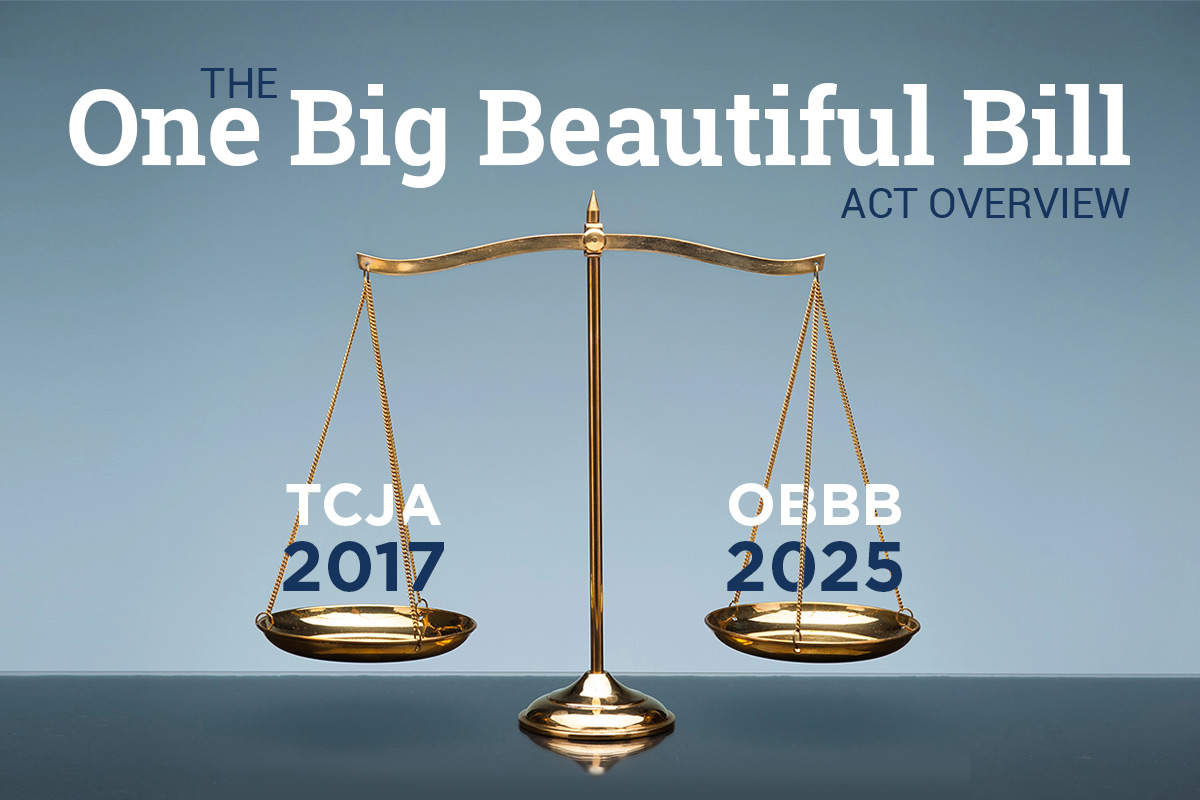
On July 4, 2025, President Trump signed The One Big Beautiful Bill (“OBBB”) into law. While the bill is over 900 pages long and contains many crucial changes to our nation’s tax code, we will be focusing solely on the personal tax implications.
The More Things Change, The More They Stay the Same
To fully grasp the importance of this bill, you first have to understand the extent of what would have happened to the tax code had it not been passed. In 2017, the Tax Cuts and Jobs Act (TCJA) reduced tax rates across almost all levels of taxable income. Those tax cuts in the TCJA came with a catch – that they would only last through 2025, and without any legislative changes, the tax rates were set to revert back to where they were in 2017. The biggest accomplishment of OBBB was simply to keep tax rates at the levels where they are now and permanently extend those rates into the future.
New Key Provisions
You will notice many of the new provisions are only applicable for a certain number of years or are phased out at certain income levels. With that disclaimer, here are some of the key relevant changes:
- Higher Federal Estate and Gift Tax Threshold
The OBBB permanently sets the federal estate and gift tax exemption – which is set per person – at $15M in 2026, and will be adjusted for inflation thereafter. It was previously set to revert back to $5M, according to the statutes in the TCJA. Note some states have their own estate tax thresholds that may be lower than $15M, with some states even having inheritance taxes to take into consideration. While this increase will reduce the number of taxable estates at the federal level, people should still be mindful of their state’s estate tax laws. - New Additional Deduction for Seniors over 65
The OBBB put an additional deduction– which will be equal to $6,000 per individual ($12,000 married filing jointly) – for taxpayers over 65 years in place from 2025 to 2028. This deduction starts phasing out at the threshold for single taxpayers making over $75,000 and married taxpayers making over $150,000, and then is completely phased out at the threshold for single taxpayers making over $175,000 and for married taxpayers making over $250,000. This senior deduction is available whether a taxpayer takes the standard deduction or itemizes their deductions. This deduction is on top of the existing deduction for people that are either over the age of 65 or visually impaired. - New State and Local Tax Deduction Limit
The cap on the state and local tax deduction, which was previously set to $10,000, has now been raised to $40,000 starting in 2025 until 2029. This benefit begins to phase out at the $500,000 income threshold and then is set at only $10,000 for taxpayers making more than $600,000. - Charitable Gift Deduction for Non-Itemizers
Before the OBBB was passed, a taxpayer had to itemize their deductions in order to receive a deduction for their charitable gifts. Now that the OBBB is the law of the land, there is an opportunity for people who don’t itemize their deductions to receive a charitable deduction. The deduction is limited to $1,000 for single taxpayers and $2,000 for married taxpayers. To qualify for the deduction, the contribution must be made in cash and cannot be used to fund a donor advised fund. Charitable gifts from retirement accounts are not counted under this provision. - New Hurdle for Charitable Donations
The news isn’t all great for the philanthropists out there – before the OBBB passed, there was only a ceiling on what you could deduct for your itemized charitable donations, but now there is also a floor. Under the OBBB, now only amounts greater than 0.50% of your total income can be deducted. - Expanded 529 Plan Qualified Expenses
Prior to the OBBB, 529 plans could be used for K-12 expenses, which encompasses tuition, books, instruction materials, standardized testing and tutoring, as well as to post-secondary credential expenses. The total amount that could be expensed from 529 plans for this purpose was previously limited to $10,000 per year, but has now been increased to be $20,000. - New Auto Loan Interest Deduction
There is now a new deduction for auto loan interest in place from 2025 through 2028 – up to $10,000 of passenger vehicle loan interest can be deducted from loans taken out or refinanced after 12/31/2024, as long as the vehicle was assembled in the United States. Additionally, you don’t have to itemize your deductions to be able to use this deduction. This deduction starts phasing out for single taxpayers at the $100,000 income threshold and complete maxes out at the $149,000 income threshold. For married taxpayers, it starts phasing out at the $200,000 income threshold and is completely phased out at the $249,000 income threshold. - Clean Energy Credits Eliminated
As you may also know, clean energy tax credits took a massive hit once the OBBB was signed into law. The Clean Vehicle Credit will no longer be available for vehicles acquired after September 30, 2025, and the Alternative Fuel Vehicle Refueling Property Credit will no longer be available after June 30, 2026. The Energy Efficient Home Improvement credit will no longer be available after December 31, 2025, and the Residential Clean Energy Credit must be paid before December 31, 2025. If you are in the market for an electric vehicle, an EV charging station, new windows/doors, a new HVAC unit, or solar panels, you need get moving on it now or you will miss out on these impactful tax breaks.
Should you have any questions above the topics referenced above, please do not hesitate to contact your financial advisor or tax professional.
STAY IN THE LOOP
